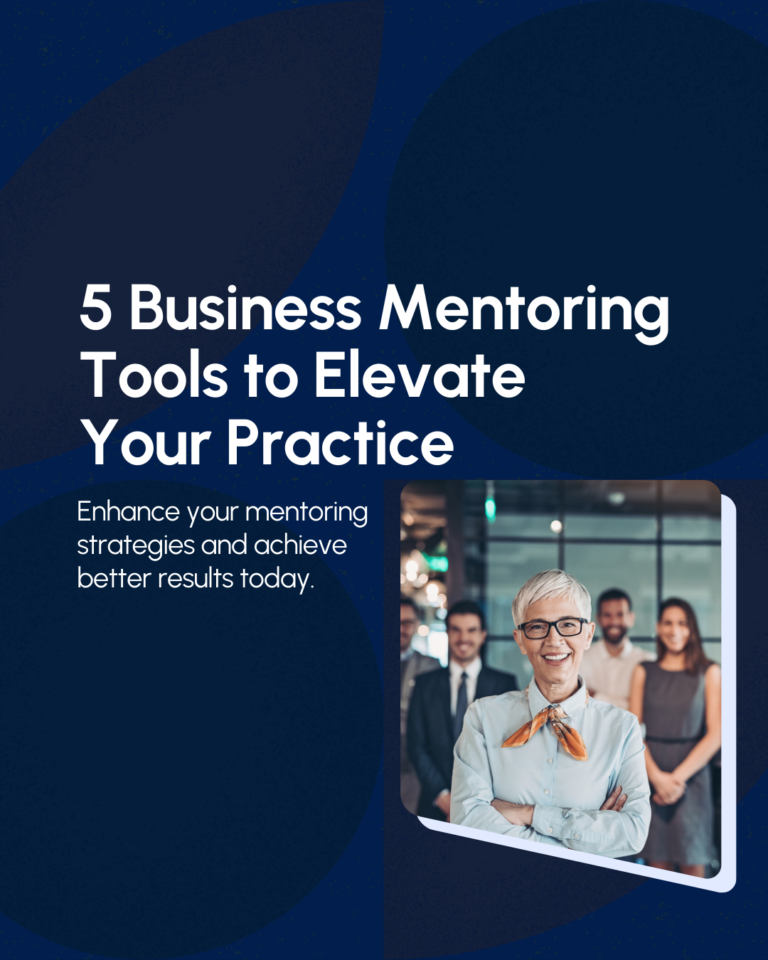In the dynamic landscape of business mentoring, the utilisation of structured tools is pivotal in enhancing the effectiveness and professionalism of mentoring sessions. These tools not only provide a framework for analysis and strategy but also ensure that both mentors and mentees can navigate complex business challenges with clarity and precision. By integrating these methodologies into your mentoring practice, you can significantly elevate the impact of your guidance, fostering growth and development in your mentees.
Your Business Mentoring Toolkit
1. SWOT Analysis
SWOT Analysis is a strategic planning tool used to identify and evaluate the Strengths, Weaknesses, Opportunities, and Threats related to a business or project. It provides a comprehensive overview of internal and external factors that can influence success.
When Should to Use in a Mentoring Session:
Business mentors use SWOT analysis to help clients gain a clear picture of their current position and guide strategic decision-making for growth and problem-solving.
During a mentoring session, mentors can use SWOT analysis to evaluate a new business idea and identify potential risks and advantages before launching, to review long-term strategies to adapt to changing market dynamics, or when facing challenges to help pinpoint weaknesses or threats and identify opportunities to address the issue.
The analysis is often visualised in a four-quadrant grid that helps in identifying Strengths, Weaknesses, Opportunities, and Threats that can impact the organisation’s goals.

2. PESTLE Analysis
The PESTLE analysis is a strategic management framework used to identify and analyse the external macro-environmental factors that can impact a business. The acronym stands for Political, Economic, Social, and Technological factors. By examining these external influences, businesses can anticipate potential risks and opportunities, which helps in strategic planning and decision-making.
How to Use in a Mentoring Session:
Business mentors often use this tool to guide their clients in understanding how external forces might shape their operations and strategies. It is particularly useful for startups, SMEs, or businesses undergoing transformation, as it provides a structured way to think about the bigger picture.
Key Objectives:
- Understand the broader environment in which the business operates.
- Identify potential challenges and opportunities arising from external factors
- Inform strategic planning to ensure alignment with external conditions.
💡 By the way — The Association of Business Mentors (ABM) offers a comprehensive Resource Area where members can access detailed guides and templates for these tools. By joining the ABM, you gain exclusive access to these resources, empowering you to elevate your mentoring practice and drive meaningful outcomes for your mentees. Discover our membership.
3. SMART Goal Setting
SMART is an acronym for Specific, Measurable, Achievable, Relevant, and Time-bound. This goal-setting framework ensures that objectives are clear and attainable within a specified timeframe.
How to Use in a Mentoring Session:
Mentors assist mentees in formulating goals that adhere to the SMART criteria. This structured approach ensures that goals are well-defined and progress can be effectively monitored.
Key Objectives:
- Establish clear and actionable goals.
- Facilitate tracking and assessment of progress.
- Enhance motivation and accountability through well-structured objectives.

4. Ansoff Matrix
The Ansoff Matrix (developed by Igor Ansoff in 1957) is a strategic planning tool used to help businesses identify growth opportunities. It is structured as a simple two-by-two grid, with four growth strategies: Market Penetration, Market Development, Product Development, and Diversification. Each quadrant reflects a unique combination of existing or new products and existing or new markets, guiding decision-making about where and how to focus resources.
How to Use in a Mentoring Session:
For business mentors, the Ansoff Matrix serves as a framework to help clients think critically about growth opportunities while evaluating the associated risks. It provides a clear and structured approach to strategic planning, making it especially valuable for small businesses or entrepreneurs seeking direction.
Key Objectives:
- Identify viable growth opportunities.
- Assess the risk associated with different growth strategies
- Develop strategic plans to achieve sustainable business expansion.
💡 By the way — If you’re looking to further elevate your mentoring practice, consider the ABM short course ‘The Art of Business Mentoring’. This entry-level course is designed by experienced mentors and covers fundamental business mentoring concepts and strategies. ABM members gain free access to this course.
5. Business Model Canvas
The Business Model Canvas is a strategic management tool designed to help entrepreneurs and businesses visually map out and analyse their business model. Developed by Alexander Osterwalder, it provides a comprehensive framework consisting of nine building blocks.
How to Use in a Mentoring Session:
The Business Model Canvas is a versatile tool that can be used at various stages of a business’s lifecycle:
- During start-up planning to develop and refine a new business idea or concept.
- For strategic decision-making to analyse the viability of a business model, test assumptions, or identify opportunities for innovation.
- In growth and scaling to realign operations, focus on profitable segments, or explore new revenue streams.
- For problem-solving to address specific challenges by revisiting and updating parts of the business model.
Key Objectives:
- Visualise and understand the current business model.
- Identify areas for improvement and innovation.
- Align business activities with the overall strategy and value proposition
Conclusion
Integrating these mentoring tools into your practice can significantly enhance the quality and impact of your mentoring sessions. They provide structured methodologies for analysis, goal setting, and strategic planning, ensuring that both mentors and mentees can navigate the complexities of business development with confidence.
Embrace these tools and join the ABM community to elevate your mentoring effectiveness and contribute to the growth and success of businesses you support.



